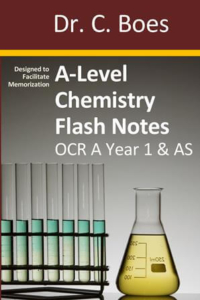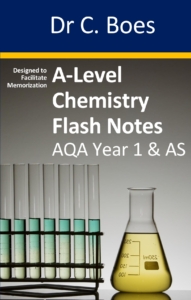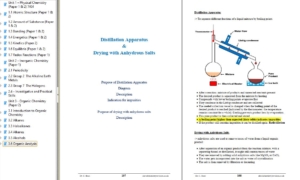 Most Concise A-Level Chemistry Revision Notes
Most Concise A-Level Chemistry Revision Notes
Dr. C. Boes
AQA, Edexcel OCR A&B Chemistry Revision Notes/Revision Cards
Imagine: An A Level Chemistry specialist who knows EXACTLY what you need to study, what equations you need to know and what revision techniques to use.
And he writes this all down, IN ONE SHORT BOOK. Interested?
With a PhD in Biochemistry and twenty years of experience as an A-Level Chemistry Tutor, I’ve put together concise revision notes for you. It’s everything you need to know. The same notes that hundreds of students have used to get A and A* results.
- Avoid the stress and hassle of reading through piles of chemistry books. Put an end to the anxiety of not being sure if you’ve revised all the right material.
- Have confidence, knowing that everything you need is written in this one book.
- Relax with the assurance that It will help you to easily achieve top grades in tests and exams.
- A book that is recommended by top Chemistry teachers and has 5-star ratings on Amazon:
- “This book is fantastic. It has all condensed A2 notes superbly written. Thank you Dr C. Boes for this life-saving book!” Nelly, Amazon customer.
- Matched exactly to the current specifications of the four main English exam boards: AQA, Edexcel, OCR A and OCR B (Salters).
Here’s what you’ll get in the book:
– Everything you need to know, in short, easy to memorize formats
– A breakdown of each topic in 1 to 2 pages
– Only your key facts, definitions and equations, with no unnecessary information
– All topics thoroughly covered in the most concise form possible.
– Written in line with official mark schemes to ensure you are getting top grades.
Easter offer (until 31/04/25): Save up to 60 % on the paperbacks!
To get these professional, top rated notes, please click on one of these options:
- PDF (ebook): RRP £
7.99, £6.99 – get them instantly and carry them on your phone (free samples available) - PAPERBACK: RRP £19.99, now from £7.99. Up to 60 % off (until stocks last!).
Ace the exams with this great revision tool!
Paperbacks
 PAPERBACKS: RRP
PAPERBACKS: RRP £19.99, now from £7.99. Save up to 60 %! UK Shipping, Royal Mail, 2nd class: 1 book £2.10, 2 books £2.40, 3 books £2.70.1 book £2.10, 2 books £2.50, 3 books £2.50.
Your order will be dispatched same or next day with Royal Mail 2nd class (average shipping time: 2 – 3 working days!). Have a look at my Trustpilot reviews.
BOOK STORE
Another 5 Star review on Amazon:
“My daughter wishes they had this book in Biology, it is that good.” Alison Laycock, Amazon customer.
Guarantee: If you don’t like it, contact me within 14 days of receiving your book and get a full refund when returned in the following 14 days. You’ll need to pay for return postage.
Please contact me if you are a Chemistry teacher and would like a complimentary PDF or paperback copy (depending on availability) for yourself or your school library. Schools can also receive special discounts on paperback bulk orders.
PDF Files
These books can also be purchased as PDF documents from my ebook shop.
Try the FREE SAMPLES in the ebook shop!
Carry these notes with you on your phone, tablet or laptop. Use the search function to find topics and keywords.
If you leave a review on Amazon, you will get a free ebook (PDF) of these Notes. Just contact me after your review has been published. 10 % of profits generated by selling these books will go to a Buddhist charity.
Please contact me for any queries or questions.
While these notes also help with understanding, they are rather designed for the just learn stage of revision. If general understanding is lacking then help from a professional tutor and additional studies of text books or revision guides, is suggested.
.
TOP REVISION TIPS
.
HOW TO USE MY REVISION NOTES
The revision cards are introduced by their titles and keywords on a separate page. After reading the title you should:
Step 1: Write down the content of the card without looking at the next page, (the keywords give you hints about the content).
Step 2: Check if your answers are correct.
Step 3: If you got them all right – great move onto the next one. If you got some wrong, rewrite the incorrect ones.
Additional tips:
At the beginning, when you are still unfamiliar with the cards, it might help to read them a few times first. If they contain a lot of content, you can cover the revision card with a piece of paper and slowly reveal the header and sub content. While you uncover it try to remember what is written in the covered part, e.g. the definition for a term you just uncovered. Do not just read the card – always cover the content!
 This uncovering technique is for the early stages, later you should be able to write down the whole content after just reading the header. If this is the case, move to the next card. If not, bookmark the card and memorize it repeatedly.
This uncovering technique is for the early stages, later you should be able to write down the whole content after just reading the header. If this is the case, move to the next card. If not, bookmark the card and memorize it repeatedly.
Do at least four to five sessions per week until you know all the cards in one chapter word-perfect. When you have memorized a revision card apply your new knowledge by answering topic questions. Then move on to the next section. You can test your familiarity with whole chapters by doing the corresponding questions in an Exam Practice Workbook.
Generally it is better to do shorter sessions more often than longer sessions less frequently. An even better option is to ask somebody to check your knowledge by reading the header aloud and comparing your answer to the content. Alternatively, get together in learning groups and support each other. Discuss topics which you don’t understand; your friend might know the answers or ask your teacher or tutor.
Only you know how you learn the best, but this quiz will help you to determine what learning type you are. There are also different memorization techniques you can use like to loci method.
HOW TO PLAN YOUR REVISION
It is important to plan your revision well in advance of the exam. Preferably, flashcards are created (or use these flash notes) and memorized parallel to topics of the school lessons with the aid of a study plan. However, the actual revision phase should begin around 8 – 10 weeks before the exams. The first half can be used to go over all topics and to write and memorize revision cards. The last phase should just be pure memorization and practising past papers. A revision timetable or calendar helps to organize the revision time effectively and ensures all subjects are covered proportionally. Calculate how many topics you have to do per day to cover all in the first few weeks. Then create a timetable with specific topics for each day. The term breaks leading up to the exam should be used to boost revision and many of the revision lessons can be clustered in this time (term dates).
Pacing
It is essential to pace yourself correctly, which also means having the right amount of breaks. Try to follow these guidelines:
follow these guidelines:
- After one hour of revision, take a 5 – 10 minute break
- After 3 – 4 hours of revision, take a longer break of 30 – 60 minutes
- Around 8 hours of revision can be assigned for a typical full revision day during holidays and study leave.
One day per week should be a full rest day with no school or revision work. This break day is very important because it helps the new knowledge to settle and avoids confusion. In each term break 2 – 3 days can be set aside as rest days.
Please don’t wait to begin your revision until the school lessons have stopped and cram everything in the last few weeks. The amount of knowledge of all three or four A-level subjects exceeds the capacity of your mind and you will exhaust yourself. Your knowledge will be scattered and confused. This is also the reason, why you should not revise on the day before the exam. This should be a rest day, so that your head is clear and you are well rested for the exam. This is especially important for Chemistry, which is based on deduction and analytical thinking, requiring a sharp mind.
Practise exams by doing past papers under exam conditions with no supporting material (e.g. books, flashcards) other than officially allowed ones: calculator, periodic table, data table (IR, NMR etc.). Set a timer and stop writing when the time is up. Check your answers with the official mark scheme. In this way you get used to the exam questions and how to correctly present the answers. You will also become familiar with the exam situation and get to know your weaknesses and strengths. Calculate your grade and see if you improve over time. Practise as many papers as possible. If you run out of past exams, continue with other exam boards. For Paper 3 (Practical Skills) it is recommended to study the Practical Chemistry books.
Past Papers (Chemistry):
Syllabus:
Revision Guides:
- Good summaries: Chemrevise
- Good topic tests: mathmadeeasy, physicsandmathstutor
- Printed Revision Guides: CGP
- Revision Quiz: Seneca
EXAM TECHNIQUES
When the day of the actual A-level exam arrives: don’t panic! You are well prepared for it by having memorized the flashcards and practised past papers. Begin with a quick look through the exam. How is it structured; what topics are coming up and how many questions are there? Then work systematically through it from the beginning, but keep an eye on the time. When you fall behind shorten your answers and leave difficult topics for the end.
Circle, underline or highlight the important information/data in the question. If just names for compounds are given, write the chemical formula above it (e.g. sulfuric acid -> H2SO4). Circle the functional groups in an organic formula and name them. Draw the carbons and hydrogens in skeletal formulae or displayed formulae if the structural formulae are given. Make sure you read the question thoroughly and be aware what actions are expected from you from the command words used. Identify the topic of the question and mentally bring up the flashcards associated to the topic. They will help you with the answer. If you have problems understanding the question, read it again slowly and also read through the follow up sub-questions (a, b, c etc.) sometimes the topic and the initial question becomes clearer. If you still do not understand the question or cannot come up with all the answers, do not spend any more time on it. Write down your best answers or just standard keywords/phrases from the flashcard. Writing something is better than writing nothing. You might still get some marks for it. Circle/mark the question and come back to it at the end of the exam.
If you do calculations, write down a list of the data given (time permitting – otherwise just underline) and the formulae/equations which you are using (even if your calculation is wrong, you might get a mark for the correct formula). Always show your workings and do the unit calculations. This means writing the units next to the numbers and cancelling or multiplying them accordingly. You should get the correct unit for your final answer. If not, you might not have converted them correctly (e.g. cm³ into dm³) or have used the wrong equation. After writing down the final answer check if it makes sense (is the number in the expected range; does it have the correct sign in front, e. g. – for an exothermic reaction etc.). Calculation answers should always be given in decimals, never fractions. Furthermore make sure you have answered all the questions and everything asked for (e.g. state symbols, significant figures etc.)
 For multiple choice questions: read all answers and strike through the ones which are definitely wrong. Choose the correct or most likely of the remaining ones. If you have no clue take the longest answer. Always choose an answer -> you have at least a 25 % chance to get it right :-). Do not spend too much time on a questions. Rule of thumb is 1 min per mark. If you are unsure, circle/mark the question and come back to it at the end of the exam.
For multiple choice questions: read all answers and strike through the ones which are definitely wrong. Choose the correct or most likely of the remaining ones. If you have no clue take the longest answer. Always choose an answer -> you have at least a 25 % chance to get it right :-). Do not spend too much time on a questions. Rule of thumb is 1 min per mark. If you are unsure, circle/mark the question and come back to it at the end of the exam.
When you have finished all questions, go back to the ones you had problems with. Read through the complete question including sub-questions again. Sometimes the answer or hints to it, can be found in the sub-questions. Then go through all the other questions and answers and look for obvious mistakes.
Good luck!
PhD in Biochemistry
Attleborough
Norfolk
Disclaimer ....|. ..Privacy Policy. ..|. .. Onedrive Referral …. | …. Dropbox Referral …. | … PDF Editor …. |…. Student availability
Disclosure: I am a member of the ‘Amazon Associates Program’. I earn a commission from sales created by affiliate links to Amazon.
Copyright © 2015 Dr. Christoph Boes, Thornby




